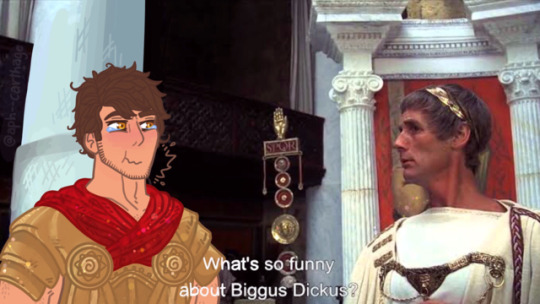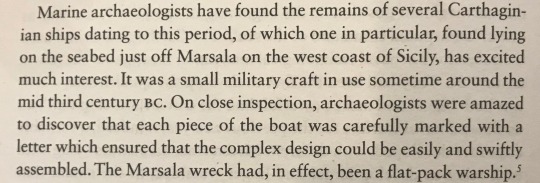#punica fides
Explore tagged Tumblr posts
Text

Fides Punica


Roman Town House Mosaic, Caerwent, 300-400CE, St Fagans National Museum of History, Cardiff, Wales
256 notes
·
View notes
Text

he got Biggus Dickus Energy
#aph rome#grandpa rome#click for higher resolution#ancientalia#aph ancients#life of brian#hetalia art#ancient history#aph--carthage#biggus dickus#pontius pilate#terry jones#history memes#foxy grandpa irl#punica fides
182 notes
·
View notes
Photo




sansarika liked your photo: for a four-picture summary of anysus barca / aph carthage
2 notes
·
View notes
Text
Thinking about Ovid's Amores 2.6....particularly:
Quid tamen ista fides, quid rari forma coloris, quid vox mutandis ingeniosa sonis, quid iuvat, ut datus es, nostrae placuisse puellae?— infelix, avium gloria, nempe iaces! tu poteras fragiles pinnis hebetare zmaragdos tincta gerens rubro Punica rostra croco. non fuit in terris vocum simulantior ales— reddebas blaeso tam bene verba sono!
because I got my url from this passage :)
I love "zmaragdos" because a) it is a very exotic way of saying emerald (or malachite or jasper or green gemstone generally), b) it's the Egyptian name of an emerald mine that made it into latin via greek (so that's neat)
#doing some light ovid reading this afternoon :)#ovid#zmaragdos#i love amores 2.6 because it is an elegy for a parrot#we need more poetry that is elegy for birds#catullus gets it with 3's death of sparrow
5 notes
·
View notes
Text

brüh sweden swëåting right nøw

i go to carthaginian ikea….. I Purchase A Flat-Pack Quinquåeremë…..
(from carthage must be destroyed by richard miles)
#aph carthage#wild times#love me some ingenuity#hetalia#aph sweden can fight me the bitch ass#punica fides
2K notes
·
View notes
Note
🌻
Give me your purest crack and I shall consume
Well, I can't give you crack but I can give you the cracks in the ... entire building and foundation of the Late Roman Republic!
Send me a 🌻 and I'll tell you whatever the fuck I want
One of my favourite pasttimes is coming up with AUs, but I never write them, because I know how much of an effort it would be. I don't want to deliver anything half-baked for the sake of it existing and I especially don't want to take time away from writing my main projects that establish the characters in the first place.
There is one exception, however. My little pet project of the Res publica AU. One of my all-time favourite bookseries is the Cicero Trilogy by Robert Harris, which is a fictionalized retelling of Cicero's political career. The politicking. The drama. The intricate machinations. I love it all so much. Which is why I came up with an AU set somewhere non-specific in the Late Roman Republic (133 BCE to 27 BCE), although it's set either before the civil war between Marius and Sulla in the 80s BCE or the civil war between Caesar and Pompeius in the 40s BCE. I am tending towards the latter.
The basic gist of the AU is that two men gave each other backhanded insults at a party and then that grew into a whole thing. Francesco Belfari is a Roman citizen living in the bay of Naples, whereas Michele hails from Syracuse on Sicily, though he is no less Roman by law. They meet at a dinner party and their longstanding, low-simmering enmity manifests itself in a banter about how the other should go and try be a politician in Rome, they have all the snake oil salesman qualities for it. During the next years, however, both Michele and Francesco have the idea grow of them independently - and when they find themselves both in Rome at the same time to run for the senate, an unspoken bet is made: Whoever gets further in the cursus honorum, wins. A game of political rivalry and maneuvering thusly begins ...
By now, I'm also striving that each drabble I upload into the collection would teach the reader something. Not anything grand, not any moral point, but that each drabble would concern itself with an aspect or more of daily Roman political life during that time. You can check out the drabbles already uploaded in the link I provided. I now want to talk about the drabbles I still have planned and might add in the future:
(Content warning for sensitive topics such as ancient slavery)
Summary: Francesco comes home from a dinner party, utterly frustrated, and comes onto his lover & slave Dolcetto. Pillow talk turns to a discussion about free choice and living life without it. Topic: Slavery and its nature on a very personal level. I already have this drabble all typed up, but I am hesitant to post it just yet. The topic is an important one to discuss and explore in a setting like this, I think. I wanted to highlight how dehumanizing the entire state of being a slave is, no matter how you're treated. It's inherently a form of violence to confine any person's freedom of action. To keep it unadressed when many of the characters in this setting are enslaved people wasn't right. It's a nuanced take on the situation.
Summary: Michele returns from the senate in tatters and with much ruckus following him. Turns out that he had gotten into a brawl in the senate due to a rather defamatory speech by Francesco about his alleged origins. Topic: How Roman xenophobia worked & was weaponized in a political setting. Since in Rome, you didn't really run with a political platform, but with your integrity as a person, campaigning got deeply personal. I still haven't come around to read Punica Fides by Herbert Heftner (which any of my germanspeaking clutuals can access with an account on academia.edu!), but that would be the basis. Both Francesco and Michele suffer already from allegations of being 'greek-y', since both of them come from areas of Greek colonization, but with Michele's father from Panormus and Syracuse's general history, the allegaton of being 'punic' aka phoenician aka carthaginian, and thusly untrustworthy and unrealiable is an even harder hammer. I am still unsure about writing this one, however, for I think a brawl in the senate isn't unprecedented, but would wreak a lot of damage for their careers. Michele and Francesco simply do not have the same political standing and allies as the heavy hitters of their time to allow themselves such an undignified display of affect. They're not tribunes sponsored by Pompey or heirs to one of Rome's very old aristocratic families that consistently renewed its political capital over the years. They're two homines novī who achieve their political victories by the skin of their teeth.
Summary: Right before their move from the bay of Naples to Rome, Francesco gets cold feet in his study when he realizes he lacks skills, connections and money to garner clients and has to be talked back into the project by his household members. Topic: The client system of Ancient Roman society. People garnered social standing and an effective network of voters and other supporters by playing patron to clients. This would mean that in exchange for natural produce or services and their political loyality, the patron would be obliged to help his clients with finding work, some financial assisstance or representing them in court.
Summary: Antonio has returned from fighting rebels in Hispania and Francesco visits him during a visit to the Vargas to talk about their political future. After Francesco's visit, Antonio would like to rekindle old passions with Lovino though ... Topic: The importance of military success in Roman society. (An as of yet undrafted story about the Spamano morning after is for the whole nuanced situation about same-sex relations in ancient Rome.) Military success was something that could not only garner his achiever everlasting glory, but of course also immediate political capital. Even though Antonio may not have achieved the conditions for a military parade, whether a triumph or ovatio, since he wouldn't be able to enter the city before either of these had been granted to him by the senate, he'd still be lauded by the senate and be able to donate loot to the temples.
That's all the ideas I have notes for now, though by far not all that have crossed my mind yet. Thank you for listening!
#beareplies#magictrio1118#I don't get to talk enough about the res publica AU I love it so much#I truly wish I had the time to read more books for it again#but maybe this year!!! I want to read more books again anyways#edit: I also just checked what you need for an ovation and ... mate tonio you couldn't even get a triumph?#do rebels count or not ... maybe more of a slave rebellion ...#bc I know our Tonio is an airhead but I do concede him the braincells still to NOT throw this prestige away just to get back into the city#to smooch lovi. let lovi come into the guesthouse/your military camp outside. jesus.#storie nostre#franci#miche#dolco#francetto#tonio#lovi#hetalia oc#aph sicily#hws sicily#aph spain#hws spain#aph romano#hws romano#spamano#as you can see by these tags I Want Attention ✨#aph
4 notes
·
View notes
Quote
La retorica nasce in Sicilia, nelle colonie greche. È un dato non privo di interesse. Dei Greci conosciamo le virtù, un po' meno i difetti. “Graeca fides”, la affidabilità dei Greci, era una espressione che i Romani non potevano pronunciare senza una inflessione ironica, come “Punica fides”. Assomiglia alla accezione con cui i popoli nordici usano l'aggettivo "italiano" e non stanno parlando del Rinascimento. Il "credito greco" per Plauto (“Asinaria”, 199) era quello che mai si sarebbe potuto riscuotere se non alle calende greche, che appunto non esistevano. Astuzia, menzogna e tradimento erano praticati con una destrezza intensificata dall'orgoglio. Sullo sfondo di questo inquinamento ambientale si colloca l'aneddoto del siracusano Corace, che insegna a Tisia la tecnica del parlare efficace — questo il significato originario della parola "retorica" —, così da persuadere l'ascoltatore. E Tisia, al termine delle lezioni, si rifiuta di pagarlo. La sua argomentazione è questa: se mi hai insegnato bene la retorica, devo convincerti che non ti devo niente. E non ti pago. Se invece non riesco a convincerti, vuol dire che non mi hai insegnato bene la retorica. E non ti pago. In tutti e due i casi non ti pago. La disputa sembrerebbe conclusa, ma l'aneddoto ha un compimento ad anello. Corace replica: se riesci a convincermi che non mi devi niente, vuol dire che ti ho insegnato bene la retorica. E mi paghi. Se non riesci a convincermi, mi paghi. In tutti e due i casi mi paghi. Non sappiamo quando ha termine la disputa. O meglio, sappiamo che non ha termine. Corace e Tisia disputano in eterno, l'uno opponendo all'altro gli stessi argomenti, simmetrici e capovolti. È questo il senso immortale dell'aneddoto, che ci svela aspetti essenziali della retorica. Uno è che l'arte del dire può essere tanto efficace da inibire l'emergere della verità e da imporre un risultato di parità ai due contendenti. Una sorta di terrorismo intellettuale li costringe alla paralisi, come le armi moderne nella strategia del terrore. L'altro è ancora più sinistro. Nessuno vince, ma uno ha ragione e tutti e due lo sanno. È il maestro che ha ragione. La retorica — non essendo la saggezza, ma una tecnica che offre vantaggi a chi la pratica — non può che comportare un compenso per chi la insegna. I sofisti, che la divulgano in Grecia, sono i primi maestri a esigere remunerazioni elevate. Aristotele racconta nella “Retorica” (III, 14) che Prodico di Ceo, quando vedeva il pubblico distratto, gridava: «Eccovi il punto da cinquanta dracme!» e otteneva subito l'attenzione dell'uditorio. Corace quindi dovrebbe ricevere il compenso. Ma, assoggettandosi alle regole della tecnica da lui stesso insegnata, disputa sterilmente in eterno. Un terzo aspetto è infatti la sterilità — etica, intellettuale ed estetica — della retorica, quando da mezzo si trasforma in fine. Questo in politica ci consente di considerarla con indulgenza, come un innocuo esercizio verbale: perché serve a coprire ciò che non lo è.
Giuseppe Pontiggia, Prima persona, 2002.
#Giuseppe Pontiggia#Pontiggia#Prima persona#2002#leggere#lettura#letteratura italiana#citazioni#cultura#scrittori#letture#scrittori italiani#citazioni letterarie#anni 2000#anni '00#Retorica#Plauto#antichità#antichità classica#inganno#grecità#romanità#verità e menzogna#verità#menzogna#mentire#ingannare#Greci e Romani#antichi Greci#Romani
44 notes
·
View notes
Text
I Fenici
Le parole “verità fenicia” o ” fides Punica” e ” storia fenicia ” furono utilizzati dagli antichi Greci e Romani a significare un tradimento o una bugia . Mentre i Fenici erano considerati molto capaci come marinai ( i Romani clonarono con entusiasmo una cinqueremi cartaginese quando la trovarono incagliata ed abbandonata ) , artigiani e commercianti noti, tra le altre cose, per il loro vetro e…
View On WordPress
7 notes
·
View notes
Photo

L'Assedio di Petelia
“L’Assedio di Petelia”, dramma storico in tre atti scritto dal prof. Giovino Iannotta e con musiche originali dei cori del maestro Alfredo Cortese. L’evento sarà presentato sabato 10 giugno p.v. alle ore 20.30 nella suggestiva cornice di piazza Castello. Si tratta di una ricostruzione dei contesti storico culturali che hanno visto protagonista Petelia nel 209 a. C. in contemporaneità con la 2a Guerra Punica (218-202 a. C.). La parte più importante della storia di Petelia è ricordata con il patto di amicizia con Roma durante le lotte dei Romani contro i Cartaginesi. In questo contesto storico, si svolge l’incontro tra Caio Megonio, patrono della Città, ed il Consiglio dei Decurioni e dei personaggi più importanti della città, che si occupavano di amministrare e governare il municipio, affinchè si decidesse come fronteggiare l’assedio di Annibale cartaginese. Questi, dopo avere sconfitto i Romani nella disastrosa battaglia di Canne, cercava di conquistare il territorio e le città dei Lucani e dei Bruzi con l’intento di ottenere l’alleanza contro i Romani per facilitare l’eventuale impresa contro Roma. Molte furono le città che in seguito alla resa si allearono con i Cartaginesi. Quando però si trattò di Petelia, città legata con salda amicizia e giuramento di fedeltà a Roma, la risposta fu di resistenza a tutti i costi. La decisione è assunta in casa di Caio Megonio dove la maggioranza dei Decurioni si mostra favorevole alla resistenza, contro la volontà della minoranza guidata da Conio e Pellenio, propensi invece ad arrendersi ad Annibale. La scena dell’incontro sarà ambientata nei pressi del Castello di Strongoli, dove prenderanno parte 13 attori non professionisti. La rappresentazione avrà l’intento di riportare in vita una parte della storia di Petelia ricostruendo alcune scene per far comprendere in maniera più completa il passato. Le sfaccettature dell’evento saranno presentate nei particolari con attenzione per ciò che riguarda i costumi, le armi, le armature del periodo rappresentato. Tra le luci soffuse del tramonto si svolgerà il Consiglio dei Decurioni per la decisione di chiedere aiuto a Roma con l’invio del saggio Onata, quale ambasciatore di Petelia, per sconfiggere definitivamente i Cartaginesi. A Roma, il Senato Romano, pur ascoltando la supplica degli ambasciatori petelini con attenzione, alla fine manifesterà il rammarico per non potere soddisfare la richiesta di aiuto a causa della triste condizione della Repubblica dopo la terribile disfatta di Canne e per la necessità di fronteggiare un molto probabile assedio a cui i Cartaginesi si stavano preparando. I senatori precisarono però che Petelia era prosciolta dal giuramento di fedeltà a Roma e che i Petelini erano liberi di assumere le decisioni che ritenevano più giuste per il bene della città. Nonostante la risposta negativa di Roma, a Petelia non ci si perse d’animo e si continuò con accresciuto coraggio a resistere. La paura e l’ansia dell’assedio si manifestarono anche in un sogno premonitore ad Eusebia, moglie di Caio Megonio. Con eroico coraggio l’esercito petelino respinse i furiosi attacchi del nemico. Intanto Annibale, vista la precaria situazione delle sue truppe che non riuscirono nell’impresa, si recò personalmente sotto Petelia e decise di tramutare l’assedio in blocco per ottenere la resa per fame e sete della città. Si riunisce il consiglio degli ottimati e all’unanimità, con l’accordo di tutti, plebe compresa, e si decide di radere al suolo Petelia con ogni mezzo, primo fra tutti il fuoco, piuttosto che consegnare la città ad Annibale. L’episodio della distruzione viene narrato da diversi autori latini e Petelia viene ricordata come “fidelis” e “seconda Sagunto” per avere preferito la morte alla soggezione al crudele nemico che conquisterà solo una città distrutta.
http://www.eventiincalabria.it/eventi/lassedio-di-petelia/
0 notes
Audio
Bottin
'Poison Within' · feat. Steve Strange
from album 'Punica Fides'
Written by Guglielmo Bottin · François Julien Gamaury
Produced by Guglielmo Bottin
©2014 Bear Funk
#Music#Bottin#Poison Within#Steve Strange#Punica Fides#Guglielmo Bottin#François Julien Gamaury#Bear Funk Records#2014
13 notes
·
View notes
Text

After her reconstruction under Augustus, Carthage had very little idea how to regard the things that were the land she'd once ruled.
#Aph spain#i mean spain is still ispania/hispania but shhh#aph portugal#aph carthage#clicc for hd 💪#mumma sailor with her to-be conquistadors#carthage cant cope with kids#aph ancients#hetalia#ancient history#hetalia art#ancientalia#based and punicpilled#aph--carthage#punica fides
67 notes
·
View notes
Text
very sexy of silius (sorry) to talk abt hannibal breaking treaties in the same breath as being feverishly sworn to his Oath. hashtag when the fides is punica
10 notes
·
View notes
Text
take this quiz and find out! it’ll have you check off all traits that you think apply to your muse, then calculate a color.
tagged by @viltismanedar
tagging: @splendidanatolia @eyesofanirishman @vilavelebita @severnayastolitsa

Your dominant hue is green. You're logical and steadfast, focused on figuring life out and doing what makes sense. You value being trusted because you know you're taking the time to figure things out and everyone should just follow you. Your saturation level is very high - you are all about getting things done. The world may think you work too hard but you have a lot to show for it, and it keeps you going. You shouldn't be afraid to lead people, because if you're doing it, it'll be done right. Your outlook on life is slightly darker than most people's. You try to see things for what they are and face situations honestly. You'd rather get to the point than look for what's good.
I CAN’T BELIEVE IT’S NOT PURPLE
3 notes
·
View notes
Photo

Italian Synth Maestro BOTTIN Releases 'Punica Fides' This Week
On Bear Funk Records; New Full-Length Of Hypno-Boogie, New Wave, Acid, and Much More.
0 notes
Text
Anonymous asked: I bet Carthage has a smile that gets her all the good deals when she's trading.

"Confidence in your dealings is a good way to profiteer — and that gives me another reason to smile."
-Ṣap̄anbaʿal
#so smug#such a pretty smoosh of a smile#aph carthage#click for high res#aph ancients#hetalia#ancientalia#aph--carthage#hetalia art#punica fides#ancient history
33 notes
·
View notes
Text
@taniii-chan asked: Been a while since my last ask. Could we have a carthage at sea? or some numidia Mauritania interactions?

//I can give you all three of 'em interacting by the sea!... and trying to stop Carthage from punching Libyan's face in, but still.
#aph carthage#aph numidia#aph libya#aph mauritania#aph ancients#hetalia#ancient history#ancientalia#hetalia art#aph--carthage#hetalia ask blog#punica fides
27 notes
·
View notes